Text
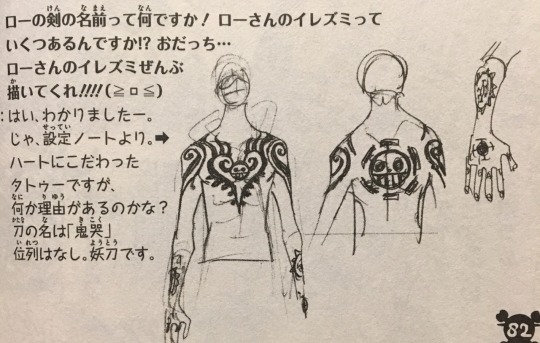
Law’s sword is named 鬼哭/kikoku, which is an archaic term that means ‘the wailing of a restless ghost.’
801 notes
·
View notes
Text
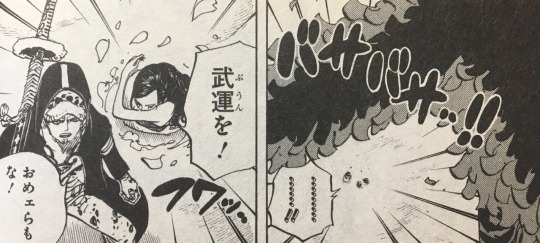
I kinda love Robin and Law’s quick farewell here as Doflamingo appears. She tells him 武運を/buun wo, which means ‘the fortunes of war’- in this context, it’s something like ‘good luck in the battle to come.’ And he responds with おまえらも/omaera mo, which is ‘same to you.’
670 notes
·
View notes
Photo
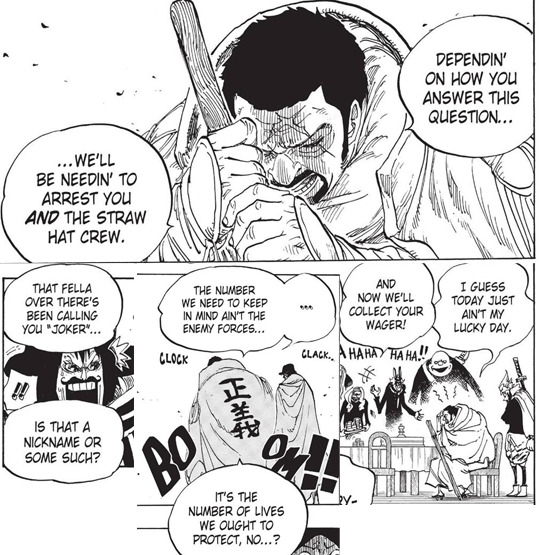
something i’ve always been curious about: in the official english translation, both when fujitora’s talking to other marines and to enemies, he’s written as having…some sort of accent? it almost reads as american southern, with him using “ain’t”, “fella”, and the occasional double negative, saying things like “that’s mighty kind of you" and dropping the ‘g’ at the end of -ing verbs. (above are just a few examples from within the chapters that you’ve read, there are many more throughout his appearances in dressrosa)
is there something different about the way fujitora speaks in japanese that would have inspired this choice?? does he read as having some kind of dialect? or is it just random artistic license on the part of the translator lol? - @sableu
He does speak with a dialect! First of all, I don’t actually know all that much about the various regional dialects of Japan, so take everything I say here with a grain of salt, but! I think it’s Kansai-ben. Specifically, Kyoto dialect, which tends to come across more soft, and is actually rooted in courtly speech from when Kyoto was the capital of Japan. It mostly shows up in his use of やす/yasu to end sentences and verb conjugations, which is, kind of more generally respectful.
The reason he gets an American Southern accent, then, is because Kansai-ben is stereotyped as basically the ‘folksy’ accent in Japan, and is usually represented in foreign translations by replacing it with an accent with a similar regional stereotype. So in America, that’s Southern/Texan, in England it’s usually Cockney, in Spanish it’s Mexico City Spanish.
So that’s why he has the accent- personally I don’t think it matches perfectly with his speech in Japanese, which is very dialectal and yet is also polite and old-fashioned, and is a more specifically soft and formal subtype of that dialect. But I also can’t really think of any better way to represent it in English, because we just don’t have a solid equivalent to this kind of speech.
290 notes
·
View notes
Text
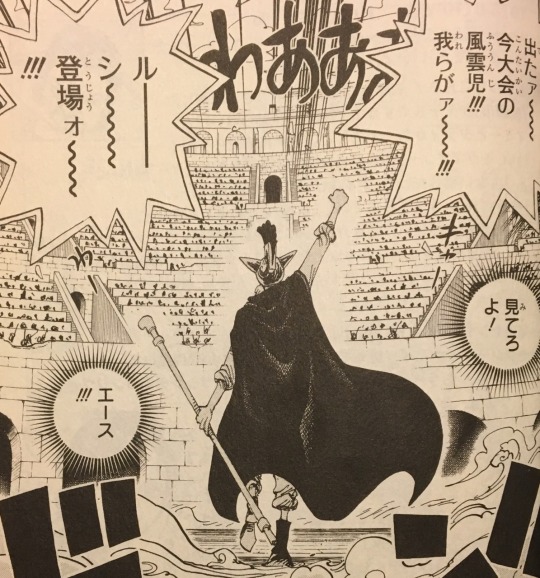
The announcer at Corrida Colosseum introduces Lucy (actually Sabo, but he’s referring to Luffy when he says it) as a 風雲児/fuu’unji.
It’s a word I really like, especially for Luffy. It means ‘lucky adventurer,’ or ‘soldier of fortune.’ Reading the kanji literally, it means something like ‘someone who’s like a cloud moved by the wind.’
And, well. That’s just Luffy, isn’t it.
494 notes
·
View notes
Text

HUGE fan of doflamingo’s absolute “what the fuck” moment when he gets the report of strawhat luffy breaking into the castle AS HE IS WATCHING ‘lucy’ fighting in the colosseum
504 notes
·
View notes
Text

Someone asked me awhile ago whether Luffy refers to Law as tomodachi (friend) or nakama (crewmate/teammate) in Punk Hazard, and the answer was tomodachi, but by the midpoint of Dressrosa he’s been upgraded to nakama. He’s not thrilled about it.
978 notes
·
View notes
Text


So, the first online translation of this line was “Hey Luffy, I don’t care about the sea without you.” and maybe it’s because Usopp’s my favorite and this shows a lot of growth for him (from someone who quit the crew when he felt he wasn’t strong enough to not wanting to follow his dream if it’s not as a Straw Hat pirate), but that was my favorite line in all of One Piece.
But then! I got the actual manga from VIZ and this is what they did to my favorite line! Please tell me what Usopp is actually saying and please, please tell me it’s not this flippant. - @rayedictator
(from the floor) LOOK HOW THEY MASSACRED MY BOY
Anyways you’re right, it’s not that flippant, and in fact fully kicked me in the chest when I first read it. What Usopp says here is おい、ルフィ! お前のいない海なんておれはまっぴらゴメンだぞ/oi, luffy! omae no inai umi nante ore wa mappiragomen da zo!
Inai is the negative of iru, which basically means ‘to exist/to be’ for living things, and umi is ocean. Because of how Japanese works you can use verb phrases as descriptors for nouns, so omae no inai umi is “an ocean where you don’t exist” or “an ocean without you.” And mappiragomen means ‘flatly refuse’ or ‘wouldn’t do for anything.’
So the line should be something like, “Hey, Luffy! I wouldn’t accept an ocean without you for anything!”
523 notes
·
View notes
Text

Doflamingo describes Rocinante as his かわいかった弟/kawaikatta otouto. Otouto means ‘little brother’ and kawaii is a word I think literally everyone who knows two words of Japanese probably knows- it means ‘cute,’ and also like, ‘dear/precious/innocent/lovable.’
What kind of hurts here, though, is the past tense. In Japanese, you can conjugate adjectives into past tense the same as verbs. In saying kawaikatta instead of kawaii, he’s describing someone who was, to him, precious/cute/lovable/innocent… but isn’t anymore.
296 notes
·
View notes
Note
on ch 781, when law is standing above doflamingo after gamma knifing him, doflamingo says something along the lines of "we're the same" or smth. what does law like, say in response to that? because although most translations seemed to say something similar, i feel like the connotations of that line are somewhat different from the different translations i've read. (might just be reading too deeply into this, idk if it's that interesting or not)

ああ、それで結構だ/aa, sore de kekkou da.
Aa is like a casual/neutral agreement/acknowledgement, and kekkou is a word with a couple different uses but in this context is like ‘fine/tolerable/okay.’ So Law’s response to Doflamingo saying “You’re the same (kind/type) as me” is basically to say “Yeah… that’s fine.”
And then electro-knifing him again.
208 notes
·
View notes
Note
Also here's a Dressrosa-related ask. In chapter 783 Doflamingo goes into one his Monologues™ around page 17 or 18 and says something like "You're a thorn in my side" or "You're blocking my path" (there are various english translations although I don't know the official one). What does he actually say in japanese and what does Luffy say in response?
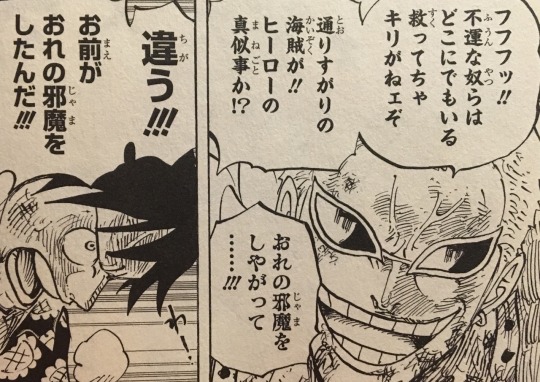
The word is 邪魔/jama. It’s a pretty common word in One Piece and Japanese in general (Luffy even uses it earlier in this same fight when he keeps Trebol from interfering with Law and Doflamingo’s fight). It means like, obstacle/interference/disturbance?
So what Doflamingo says is おれの邪魔をしやがって/ore no jama wo shiyagatte, which is literally like ‘You’re being a hindrance/disturbance to me.” And then Luffy’s response is 違う/chigau! (‘wrong’, basically) お前がおれの邪魔をしたんだ/omae ga ore no jama wo shitanda, which is basically just the opposite of what Doffy said- “You’re the one hindering/obstructing me.”
So either of those translations you provided work- personally I think “You’re in my way.” “No, you’re in my way.” would probably be best?
144 notes
·
View notes
Note
Hello! I was wondering about chapter 781 page 17, in the english and french version Doflamingo says something along the lines of "My brother was terrible and I'm glad to be rid of him, is that what you wanted to hear Law?" like he doesn't really feel that way but wants to anger Law. I always wondered if the original also gives that vibe? Also thank you very much for you blog, it's wonderful and I've learned a lot both about One piece and Japanese!!

Kinda? The two halves of that line/sentence are switched around in the Japanese- Doflamingo says お前の聞きたいセリフを言ってやろうか/omae no kikitai serifu wo itte yarou ka, which is like, ‘should i say the words you want to hear?’
Then he says Corazon (he refers to him as ‘Corazon,’ not ‘my brother’ or ‘Rosinante,’ which I think is kind of interesting) was a 足手まとい/ashidematoi (impediment/burden) and a 目障り/mezawari (eyesore/unpleasant sight), and finishes by saying あの日ブチ殺してせいせい/ano hi bushikotoshite seisei… and seisei is like, a feeling of relief/refreshment. So it’s like, “On that day when I killed him, I felt relieved/refreshed.”
I couldn’t really make up my mind about whether he means it, to be honest. The English has a pretty strong vibe of he doesn’t, but I think the Japanese is kind of more vague. I wouldn’t be surprised if it’s a mix of both. Doflamingo tends to be very contradictory when it comes to his feelings for the people closest to him.
(Also, unrelated, but we can tell from this panel that Law really does remember Cora smiling, which is… hhh.)
221 notes
·
View notes
Text
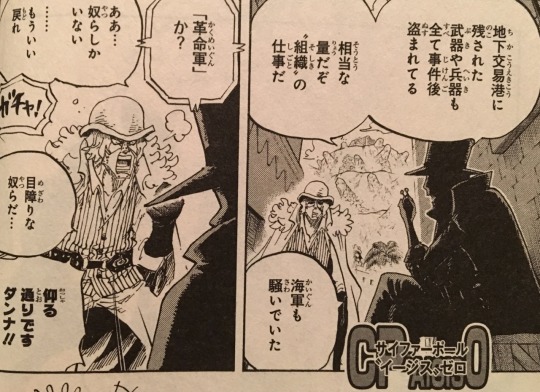
Spandam now addresses Lucci MEGA RESPECTFULLY, to a genuinely comical degree. He says 仰る通りです、ダンナ/ossharutoori desu, danna! here while being all sycophantic. Ossharutoori (meaning “as you say”) isn’t just polite, it’s sonkeigo, the whole extra set of vocabulary used to be bonus honorific and respectful. And the use of the title danna is similarly ridiculous- it basically means ‘master.’
193 notes
·
View notes
Text

Doflamingo refers to Law’s hatred of him as 逆恨み/sakaurami, which is ‘resentment,’ but specifically unjustified resentment. It’s defined as ‘resentment caused by a misunderstanding,’ or ‘resentment in response to kindness.’
296 notes
·
View notes
Note
since we are talking about upcoming backstories - i know you're probably completely spoiled for law's backstory but one of the things that struck me when i was reading it in english is that even with the eventual reveal, i felt the conversational tone taken by doffy towards law didn't really explain it? like he keeps talking about how he took law in! and he was going to make him his 2ic!! and all of us miss you law you ungrateful wretch!! and then u find out that... [1/2]
[2/2] … u find out that law was part of the gang for a grand total of 2 years when he was 10, treated not significantly differently than baby 5 or buffalo and after that 2-ish years, has spent the last 13 years hating the fuck out of doffy and planning to destroy him! like the amount of mystery and gravity around doffy and law’s past relationship to each other, doesn’t seem to match the actual reveal, to me. is that something you felt was the case with the japanese conversational tone too?
Okay, first of all… there are fanfic authors and meta writers who are smarter than me and who have put a lot more thought into Law and Doflamingo’s dynamic than I ever intend to, and I’d recommend their stuff over whatever I come up with on the topic.
But anyways- and bear in mind I’m saying this without having actually read Law’s flashback- I think it makes plenty of sense.
First point: I’ve mentioned before on this blog a few times that the Donquixote Family and Doflamingo himself tend to talk to/about Law like he’s still a kid, such as with Vergo and Doflamingo calling him ガキ/gaki (brat) and Giolla calling him with the cutesy honorific -chan, often used for small children. And Dellinger specifically refers to him familiarly as an older brother using ロー兄/rō-nii.
Second point: Doflamingo’s Family are a family. Like, a really fucked up unhealthy one, but nonetheless, they’re a family unit and it’s pretty clear all of them, Doflamingo especially, really value that. He states this super explicitly in one of the chapters I read just the other day- おれの家族だ。おれにはこいつらしかいない!/ore no kazoku da. ore ni wa koitsura shika inai! (“This is my family. There’s no one besides these people for me!”)
And Law was a member of that family. You say two years like it’s an inconsequential period of time, but it’s not, really, especially for a kid in their formative years. Fuck, Luffy and Sabo knew each other as kids for like six goddamn months, and you wouldn’t argue they’re not family. It’s kind of the same situation here, just that the familial relationship in the case of Law and the Donquixote Family is all fucked up and dysfunctional. And yeah, he’s spent thirteen years hating them since then, but they don’t know that. Doflamingo doesn’t even appear to know why Law is so dedicated to seeing him dead.
From the Donquixote Family’s point of view, as I understand it, they basically adopted this fucked up kid into their family fresh off the absolute worst time of his life and gave him a place to belong, and then said kid disappeared for like, a significant number of years, and then popped up again as a pirate absolutely rabid for Doflamingo’s blood for no apparent reason.
So, they, and Doflamingo in particular, talk to him like he’s still that kid and a member of their family, and maybe just needs his ass kicked a bit before he comes home. I dunno, it makes perfect sense to me.
330 notes
·
View notes
Text




(Requested by @indigopurple, who wanted to know about the accuracy of this translation.)
Basically- yeah, this is correct!
In Japanese, Luffy is even more emphatic when he says ‘everything’ and ‘everyone’- he says 何でもかんでも/nandemo kandemo, which is like, ‘anything and everything’, and どいつもこいつも/doitsumo koitsumo which doesn’t have an as good English equivalent but is basically the same but for people.
And then in the last panel 息がつまる/iki ga tsumaru is ‘to choke’ or ‘to have trouble breathing.’ So if you wanted to be real literal Luffy’s line is like ‘(It’s like) I can’t breathe/I’m choking,’ but I like the translation they went with here- it’s both correct and a lot punchier.
191 notes
·
View notes
Text
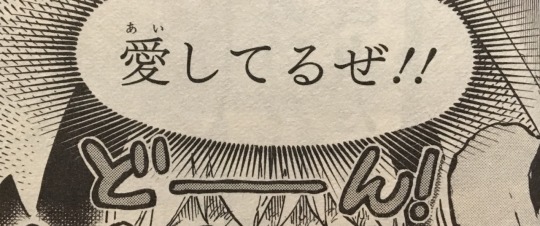
Ah, there it is, the word that wrecks me every time it’s used.
For those who haven’t been following me long- 愛してる/aishiteru is, in Japanese culture, not a common way to say ‘I love you.’ It’s only used in very serious or sincere situations- 大好き/daisuki is the much more common way to say ‘love’.
I have a whole tag for the use of different words for love specifically in One Piece. Aishiteru really doesn’t show up that often, and when it does- well, it’s the word for ‘love’ used by Ace in his dying words, and it’s the word Whitebeard uses for his sons, too.
And it’s the last thing Corazon says to Law. He ends it with a ぜ/ze, (casual emphatic) which combined with the goofy face makes the whole thing kind of more playful and silly (which I’m sure is intentional on his part), but it’s a very heavy and sincere declaration nonetheless.
565 notes
·
View notes
Text

Cavendish’s violent alter ego Hakuba is referred to as a カマイタチ/kamaitachi by Bastille. A kamaitachi is a Japanese yokai that rides on or takes the form of a whirlwind or razor wind and slices up people as it passes, which matches exactly with Hakuba’s speed and style of combat.
白馬/hakuba also means ‘white horse,’ which is Cavendish’s epithet, which makes it a pretty dead-on name for his split personality.
192 notes
·
View notes